Summer break is here, the days are long and bright, and another school year has come to an end. That sounds exciting, right? Well… if I don’t count: the long working hours at the summer job to save money for the tuition fees, the pressure of applying for a placement knowing I have no time for it over the summer (let alone the winter semester), but most of all, the dread of dusting my CV off the cobwebs that have been growing for the past two years; suddenly the warm summer breeze feels like a roaring arctic wind.
After quitting a 20-year career path in science to study filmmaking, the task of editing my CV reopens my childhood’s dark closet, and all kinds of daemons and monsters get unleashed: uncertainty, lack of confidence, fear of the unknown, indecisiveness, pessimism, cowardice, and their boss: Imposter Syndrome. Staring at my old CV, my education (BSc, MSc, PhD), research experience (nine years), awards, various skills, language qualifications (fluent in Greek, Portuguese and English), I am struggling to believe it is me who achieved all that, and I am slowly getting deeper and deeper into the feeling that I am a fraud! Every time I have to face the world, be it an interview, a presentation, an assignment, an exam, I only see failure, criticism, mistakes and rejection. How many more qualifications, awards, successes will I need in my list to feel confident? Does this ever end?
“Imposter Syndrome: The persistent set of thoughts, feelings and behaviours that result from the perception of having misrepresented yourself, despite clear evidence to the contrary.”
(Kearns, 2015a: 25)
Cycles
Now that the Monsters are out, there is no better way to follow a story, other than Dan Harmon’s Story Circle (Campbell, 2020), which I have applied in my summer Monster story (see left image below). It comprises of two semi-circles, Order and Chaos, which are defined by eight successive points: You, Need, Go, Search, Find, Take, Return, and Change. We will see how each of these points are applied to my story in detail below.
Surprisingly enough, the way we tend to tell stories (including Dan Harmon’s circle) follows a process which most of us use daily to survive through all kinds of crises. After all, there is no powerful story without a crisis! More specifically, Gibbs’ Reflective Cycle (1988, cited in Jasper, 2003: 77), with the steps of Description, Feelings, Evaluation, Analysis, Conclusion and Action Plan, is a representative example (see image right below).
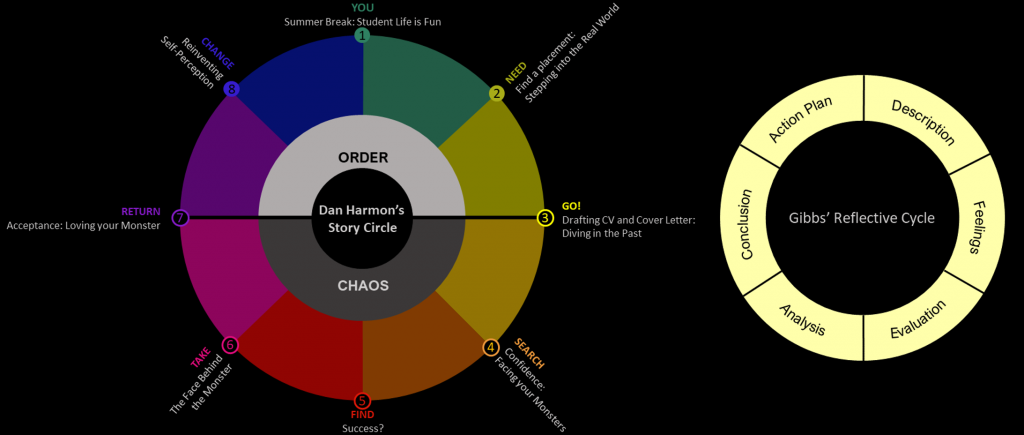
Now if we overlap the two cycles above, they will look something like this:
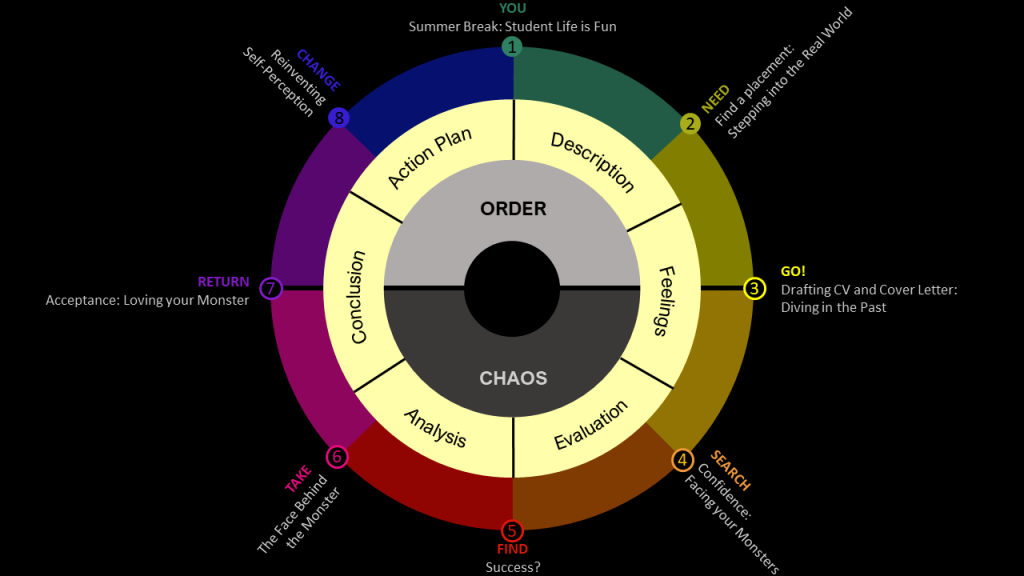
But there is yet another cycle for our Monster story, the Imposter Cycle (Kearns, 2015c: 41), which combined with Dan Harmon’s cycle looks something like this:
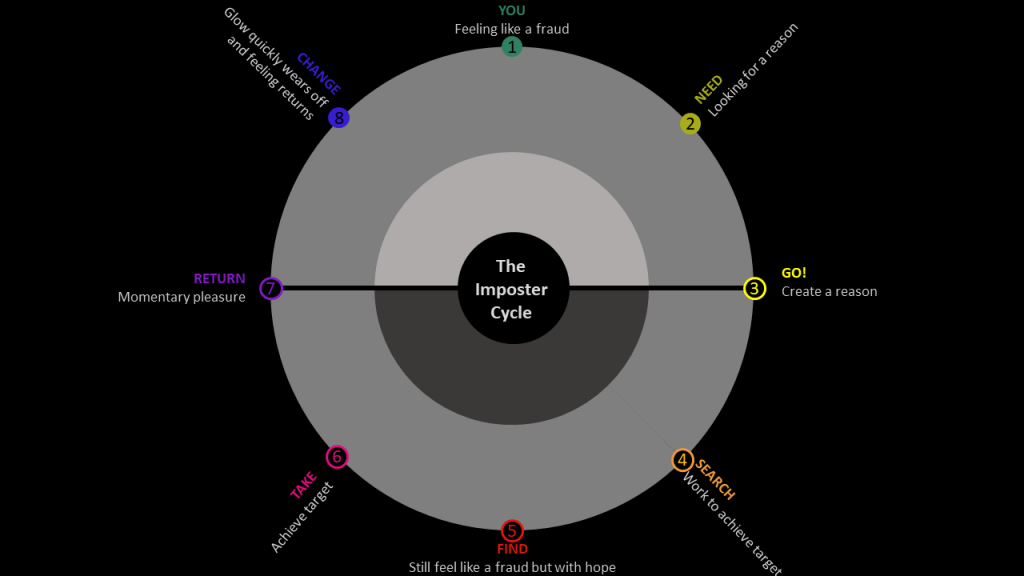
Kearns’ Imposter Cycle above shows that those who experience Imposter Syndrome get caught in repetitive cycles, where their Imposter takes over, and via successive steps of feeling like a fraud, looking for a reason, finding a reason, working hard to achieve target, achieving target, getting momentary pleasure, and losing it, they get back to feeling like a fraud again. These steps are fed by various behaviours, depending on each personality, such as avoidance, procrastination, perfectionism, overcommitting and overworking.
Cycles tell stories, because our lives are based on cyclical processes; we are born, we grow, we live, we die, and all over again. Facing our Imposter Monster, is not only a cyclical process, but a vicious cycle, which often is terrifying, paralysing, debilitating. Is there a way to break the Imposter Cycle? Is it even possible to define human nature without such vicious cycles?
Let us now see what happened last summer, and how I used Kearns’ Imposter Busting Strategies (Kearns, 2015b: 95) and learned to love my Monsters (see also the summary image below).
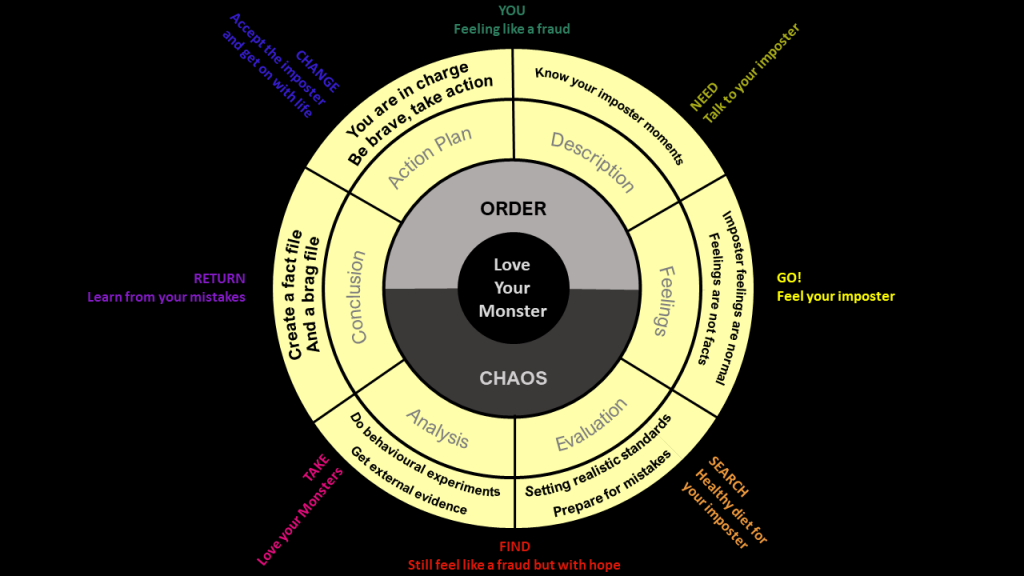
YOU: Student Life is Fun
This is the Description, the opening scene of my story, where everything seems to be in Order: summer break, student life is fun! After two years studying at the Film Studies and Production course at Queen’s University Belfast, I have started feeling like a filmmaker, and yes, there might be tons of difficulties ahead, but this is so much fun; only a week after our final assignment of year two, and I can’t wait for the next semester to start!
But wait a minute… Next semester? That will be the final year: dark clouds condensate over my head. And then what? Will I have to face again questions like: who am I, what am I good at, career, personal life, salary, happiness, success? My Imposter Monster is out of the closet, creeping in my thoughts. I know my Imposter Monster very well, and her name is Apate, the Greek goddess of deceit (“apate” in Greek means “fraud”).
Strategy: know your imposter moments
NEED: Stepping into the Real World
Looking for a placement is a reminder of how it feels like to step into the real world. Most people define the real world as: having a stable job, building a career, planning your future, planning your retirement, and other “grown-up” things. But two years ago I left all these things behind, because they seemed boring and unfulfilling. How did I end up back here again? Feelings of shame, embarrassment, and disappointment surface, and Apate is here to stay for summer holidays in Belfast.
GO: Diving in the Past
The wheel is turning now, there is no escape: myself and Apate are entering Chaos! We are deeper in the Feelings zone, the kind of feelings that are involuntary, with no sense of where they came from, and how they are going to evolve. It is CV time!
Diving in my past, brings back choices, successes, failures, and offers me a million reasons for feeling like an Imposter. And the most common reactions to Imposter Feelings are avoidance and procrastination, which thereof contribute to further anxiety, ultimately intensifying these feelings even more; Apate is growing.
Is she for real?
Strategy: imposter feelings are normal; feelings are nor facts
SEARCH: Facing the Monster

As much as I deny it and fight it, procrastination always comes to an end, either because of unavoidable failure, or, most commonly, because Apate cannot let me fail: if I fail, she will be exposed, and therefore it is time to work hard to achieve the target. Usual suspects at this stage are: overworking and perfectionism. I am adding, subtracting, editing, revisiting, rethinking, overthinking, obsessing, giving up, and starting all over again; yet another vicious cycle.
When will actually the CV be ready? Never!
The Evaluation part is initiated, and it feels like it is time to face Apate. I must understand my limits, create deadlines, and prepare myself for criticism and mistakes.
Strategy: set realistic standards; prepare for mistakes
FIND: Success?
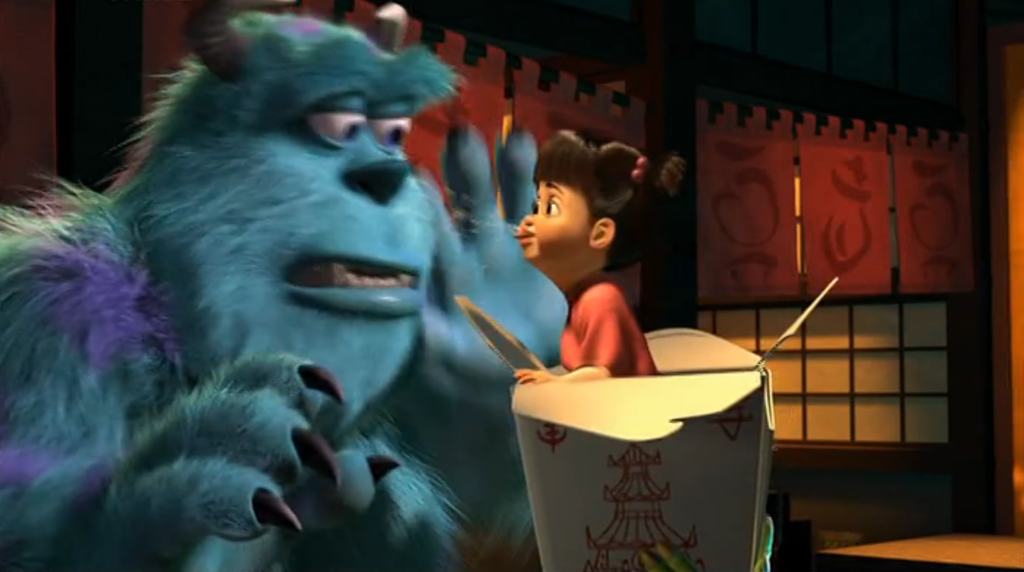
After a bit of hard work, the CV looks a bit more like what my future self should look like, and Apate cannot use any “lack of effort” excuses for my imaginary failure. A temporary feeling of success is lurking in the muddy waters of self-esteem, and just like Boo from Monsters, Inc. (2001), I am booing Apate away.
But deep inside I know that a list of qualifications and skills is not success, at least not the real success.
Am I am back at square one?
“If she were to think she could succeed she would actually fail.”
(Clance and Imes, 1978: 244)
TAKE: The Face Behind the Monster
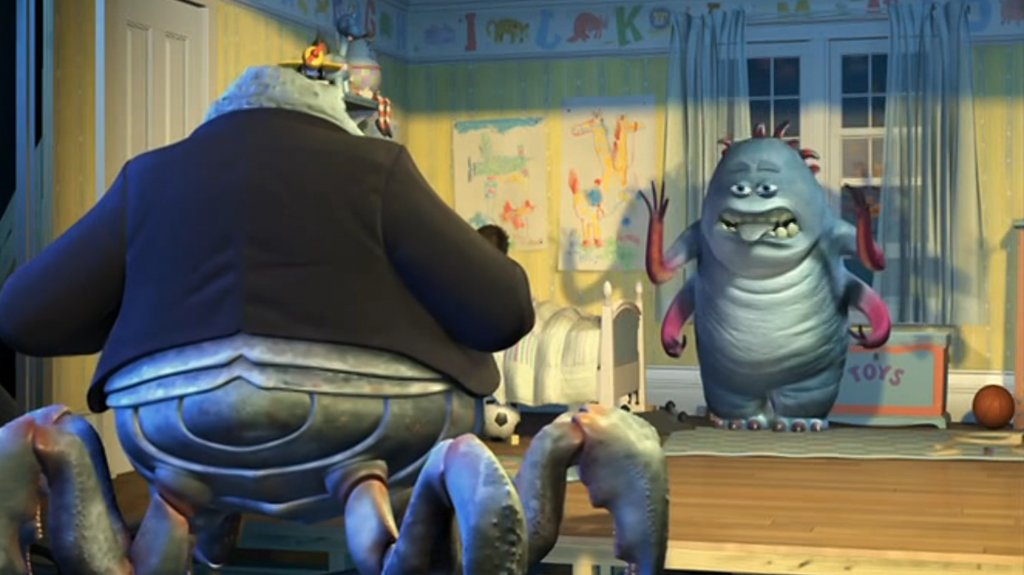
(still from Monsters, Inc. (Pete Docter, 2001))
What is success for me? As much as I thought I had got rid of the idea that concepts such as career, status, and recognition are defining who I am after leaving my previous career behind, there is definitely something resurfacing here that prevents me from feeling confident and decisive about my future.
Myself and Apate must have a conversation: it is Analysis time. I have to remind her who I really am and who I want to be, and that it is fine if in the process of becoming the future me there will be moments I won’t really like my present me. The time has come to show my CV to other people!
Strategy: do behavioural experiments; get external evidence
RETURN: Loving your Monster
Now that my CV is out there, I know I have to face the feedback. Apate appears in random moments with a smirk on her face, which tickles my nerves, but I am starting to be very good at predicting her moves.
So I am making a fact file and a brag file, things that I actually know I have succeeded in and other people can confirm, and things that I think I am good at based on these facts. I read them out loud to Apate, she starts mocking me, I tease her back, and we end up laughing with each other’s silliness.
I think I like her smirky face.
Strategy: Create a fact file and a brag file
CHANGE: Reinventing Self-Perception
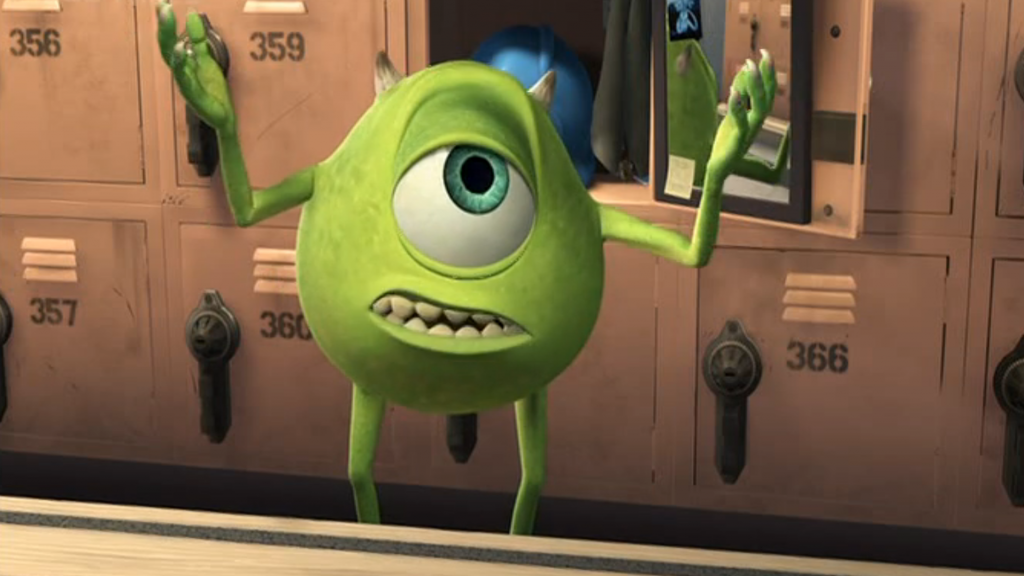
(still from Monsters, Inc. (Pete Docter, 2001))
Myself and Apate are back in Order again, but there is definitely something different this time. As I wink at her, an elliptical montage replays our angry, sad, and happy moments, and I am ready for closure (Conclusion). Not only I know her better this time, but I am starting to like her. After all, would I have gone through editing my CV if she were not around to question, push, and doubt me?
Strategy: You are in charge; be brave; take action.
As I press the “send” button for the first placement application email with my CV and cover letter attached, my Action Plan is in motion, and I can’t help but thinking that I am going to miss Apate. Now that I know I am brave to face her, and that I am in charge of my own feelings, I can confidently say:
See you next time Apate!
Filmography
Docter, Pete, Monsters, Inc. 2001. Film. USA: Walt Disney Pictures/Pixar Animation Studios
References
Campbell, J. (2020) How the Dan Harmon Story Circle Can Make Your Story Better, studiobinder. Available at: https://www.studiobinder.com/blog/dan-harmon-story-circle (Accessed: 16 November 2023).
Clance, P.R. and Imes, S.A. (1978) ‘The imposter phenomenon in high achieving women: Dynamics and therapeutic intervention’, Psychotherapy (Chicago, Ill.), 15(3), pp. 241–247.
Jasper, M. (2003) ‘Frameworks for Reflection’, in Wigens, L. (ed.) Beginning Reflective Practice. Cheltenham: Nelson Thornes (Foundations in Nursing and Health Care), pp. 71–105.
Kearns, H. (2015a) ‘Are You an Imposter?’, in The Imposter Syndrome: Why Successful People Often Feel Like Frauds. AU: Thinkwell, pp. 17–36.
Kearns, H. (2015b) ‘Imposter Busting Strategies’, in The Imposter Syndrome: Why Successful People Often Feel Like Frauds. AU: Thinkwell, pp. 95–107.
Kearns, H. (2015c) ‘The Imposter Cycle’, in The Imposter Syndrome: Why Successful People Often Feel Like Frauds. AU: Thinkwell, pp. 37–48.
